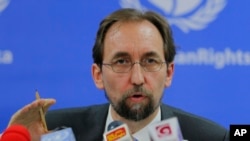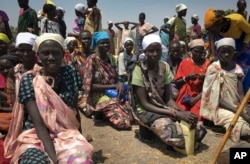The U.N. High Commissioner for Human Rights, Zeid Ra’ad al Hussein warns the entire human rights system is under attack, stoked by fears of terrorism, and xenophobic rhetoric by populist politicians. The High Commissioner presented his annual report on the state of human rights around the world to the U.N. Human Rights Council.
Human Rights chief, Zeid Ra’ad al Hussein highlighted recent developments in more than 40 countries. Among this group, he notes only four countries—Gambia, Uzbekistan, Tunisia, and Greece—have made some improvements in human rights. Otherwise, his appraisal of the human rights situation globally is uniformly bleak.
South Sudan, Burundi
For example, he deplores the violence and destruction in South Sudan, where famine is spreading. He accuses the warring parties of repeatedly engaging in alleged war crimes, including killings, rape and sexual violence, disappearances and pillage.
He says he is very concerned about the situation in Burundi where the democratic space now has been virtually extinguished.
“Grave human rights violations and abuses by security forces and the Imbonerakure militia continue to be reported, including increasing allegations of enforced disappearances, torture and mass arbitrary arrests,” said Zeid.
Turkey
Turning to the Middle East, he condemns the bombs and other shocking terrorist attacks against civilians in Turkey, but expresses concern about government measures under the state of emergency, which appear to target criticism, not terrorism.
“The fact that tens of thousands of people have been dismissed, arrested, detained or prosecuted following the attempted coup—including numerous democratically elected representatives, judges and journalists—raises serious alarm about due process guarantees being met,” said Zeid.
Iran
Another Middle East nation facing criticism in Zeid's report is Iran. He deplores the practice of child marriage in the country as "pervasive" and "harmful". Under Iranian law, girls can be married from age 13 with parental consent, while even younger girls can be married with permission from a judge.
Elahé Hicks, director of the U.S.-based Partners for Rights group, tells VOA Persian it is common for poor couples in rural areas of Iran to marry off their pre-teenage daughters to much older men in their 70s and 80s. "The main reason for these child marriages is that impoverished parents can no longer afford to care for their children," she says. "The married girls in some cases become pregnant, and they perform all the house work that wives traditionally do for their husbands." Hicks adds that some married girls are widowed by the time they become teens because their husbands have died of old age.
In the report, Zeid also censures Iran for executing 116 people in the first two months of this year and 530 people in all of 2016. He says most executions are carried out for drug-related offenses that he believes do not meet the threshold of "most serious crimes" for which the death penalty is permissible under certain conditions of the International Covenant on Civil and Political Rights.
Hicks, who previously worked as an Iran researcher for another U.S-based group, Human Rights Watch, says the Iranian policy of executing drug offenders is not stopping the country's illicit drug industry. "If you read Iranian news sites, you see officials talking about a widespread use of drugs like crystal meth in high schools," she says. The U.N. Office on Drugs and Crime (UNODC) says 2.26% of Iran's adults are opiate dependent according to national data, placing it among the countries with the highest prevalence of opiate use worldwide. But, UNODC credits Iran for responding to the challenge of drug trafficking by building "one of the strongest counter-narcotics enforcement capabilities in the region over the years."
Super powers
The High Commissioner also finds fault with several of the world’s super powers. He criticizes China for detaining lawyers and activists who fight for the rights of others. He deplores Russia’s curbs on political dissent, freedom of expression and religion.
In the United States, he expresses concern about President Trump’s vilification of entire groups such as Mexicans and Muslims. He warns the collective expulsions and deportations of immigrants could be in breach of international law, if undertaken without due process guarantees.
Michael Lipin of VOA's Persian Service contributed to this report from Washington.












